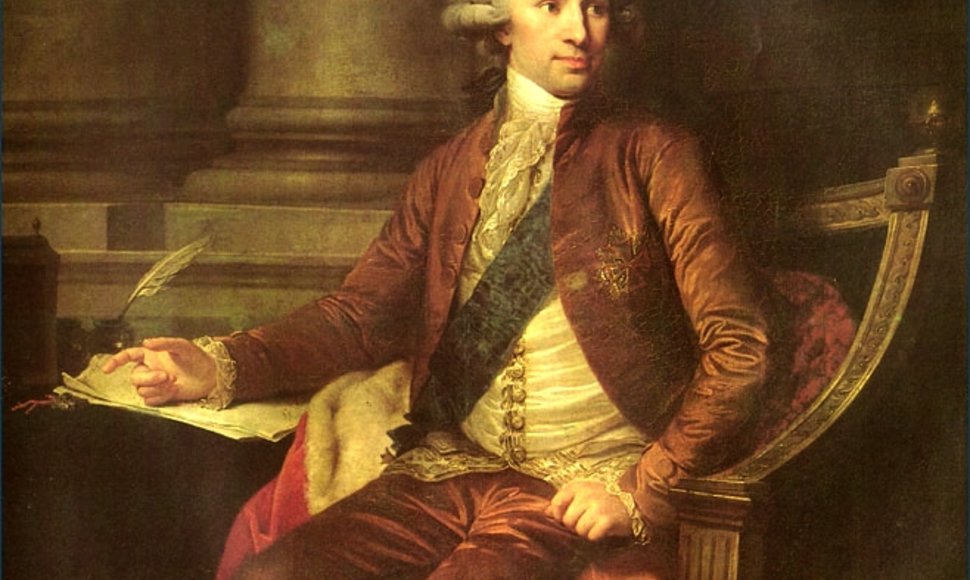The official birthday of national diplomacy is taken to be 7 October 1918, when Augustinas Voldemaras started serving as foreign minister of the newly independent Republic of Lithuania. However, a diplomatic service somewhat resembling a ministry of foreign affairs, according to historians, was first set up much earlier – 19 June 1791. A similar structure emerged in the Russian Empire only a decade later.
Historians also increasingly often remember the man who became the first minister of the “seal for foreign affairs” of the Polish-Lithuanian Commonwealth, following the Constitution adopted on 3 May 1791. That person was a nobleman of the Grand Duchy of Lithuania, Joachim Litawor Chreptowicz (Joachimas Liutauras Chreptavičius in Lithuanian).
The Chreptowicz family was not the most prominent one in the Grand Duchy, yet many of its men took high state offices between the 16th and 18th centuries. According to historian Vydas Dolinskas, the best known and most accomplished member from the noble family is Joachim Litawor Chreptowicz, who was born in 1729 near Navahrudak in present-day Belarus.
In 1754, he became stolnik of Navahrudak and in 1764, when Stanislaw August Poniatowski assumed the throne of the Commonwealth, Chreptowicz was appointed Marszalek of Navahrudak and High Secretary of the Grand Duchy of Lithuania. He was also a close assistant, confidant, and even friend to the king. The young Chreptowicz was showered with medals and estates that secured his financial prosperity.
Successor of father-in-law
One of the factors in Chreptowicz's successful career was his 1766 marriage to Konstancja Przeździecka, daughter of Sub-Chancellor of the Grand Duchy of Lithuania Antoni Przeździecki. After the death of his father-in-law, Chreptowicz was appointed in his stead and became Lithuania's sub-chancellor – minister in charge of the chancellery, archive, metrics, running foreign relations, diplomacy, and many internal affairs.
As Lithuania's sub-chancellor, Chreptowicz was de facto responsible for foreign affairs of the entire Polish-Lithuanian Commonwealth, not just the Grand Duchy. During the Bar Confederation in 1768, Chreptowicz was carrying out various missions entrusted to him by the King in France and Austria, where he worked to reconcile leaders of the uprising with the sovereign of the Commonwealth. He denounced the proclamation of interregnum in 1771 and an attempt on Poniatowski's life.
Accusations of pro-Russian sympathies
Chreptowicz's moment of fame began during the Four-Year Sejm of 1788-1792. As the Commonwealth was facing a serious crisis, a parliament assembled to draft state reforms and the Constitution. During major reorganization of the state structure, Chreptowicz was formally appointed to coordinate foreign relations of the Polish-Lithuanian Commonwealth.
The dramatic situation that the Commonwealth was in at the time made work of the first foreign minister and his ambassadors particularly difficult. Neighbouring Russia and Prussia both nursed ambitions to expand their territories at the expense of the weakened Commonwealth. Chreptowicz has often been reproached for his illusory hopes to counter outside threats with diplomacy – by appeasing and praying for the good will of the eastern neighbour. On the other hand, looking at political choices facing the Polish-Lithuanian Commonwealth in the late 18th century, it is doubtful whether salvaging the republic was possible at all.
“He saw that Russia was interested in keeping the entire Commonwealth in its sphere of influence, yet assuming that we were not masters of our destiny anymore, he hoped it would be better to be under someone's protectorate than cease existing altogether. These were his options and he tried to make a choice under such circumstances,” historian Dolinskis explains Chreptowicz's policies.
The sub-chancellor, however, was not an outright ally of Russia. There were much more passionate champions of Russia in the Four-Year Sejm, who unequivocally pushed the king to affiliate with the eastern neighbour. Chreptowicz dutifully carried out the king's orders in coordinating relations with Prussia, even though his personal opinions were opposed.
Historians have determined that Chreptowicz's pro-Russian sympathies had nothing to do with bribery or finances – he was not receiving any money from either Prussia's or Russia's embassies. He was living on income from estates granted to him by the king.
Emigration
After the Republic adopted its Constitution on 3 May 1791, Chreptowicz concentrated his attention on European reactions to events in the Polish-Lithuanian Commonwealth. Embassies in Berlin and St. Petersburg were assigned particularly much work.
Another problem that Chreptowicz faced was lack of funding for diplomacy. He would put allocation from the Finance Ministry to a bank and use interest to mend budget holes.
In 1792, Chreptowicz, as the Commonwealth's foreign minister, was forced to accept a note from the new envoy of the Russian Empire, Jacob Bulgakov, on “the friendly imperial army, invited by the true patriots of Lithuania and Poland” entering the Commonwealth. In essence, it amounted to declaration of war – and that was how the sub-chancellor of the Grand Duchy interpreted it.
In August 1792, upon starting a war with Moscow, Chreptowicz was among those who saw salvation in the king joining the Targowica Confederation. Poniatowski listened to him and that temporarily slowed down aggression of Russian troops in Lithuania.
In 1793, after the death of Aleksander Michal Sapieha, Chreptowicz became the last Grand Lithuanian Chancellor, even though he did not accomplish much in the office. In addition to wars, part of it had to do with the death of one of his sons. Chreptowicz emigrated soon after – he spent a year in Karlsbad, Vienna, then moved to Warsaw and other cities, only rarely coming back to his homeland. Chreptowicz died in 1812 in Warsaw.
The interview originally appeared in a 15min supplement "My World" which is a joint project of 15min and the Lithuanian Ministry of Foreign Affairs.












